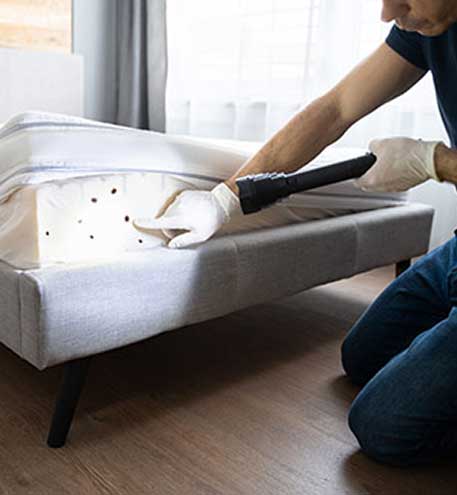Expert Kings Pest Control Cincinnati: Your Trusted Exterminators
Expert Kings Pest Control Cincinnati: Your Trusted Exterminators
Blog Article
A Breakdown of the Various Kinds Of Pest Control Solutions
In the realm of pest control, a wide range of methods exist to deal with and fight the existence of unwanted animals. From the standard usage of chemical pesticides to a lot more cutting-edge organic control options, each technique uses unique advantages and limitations. As we browse with the diverse landscape of pest control solutions, understanding the intricacies of each approach comes to be vital in identifying the most efficient program of action. Keep tuned as we check out the nuanced world of parasite control methods and find how each type plays a distinct role in guarding our atmospheres.
Chemical Pesticides
Chemical pesticides are generally used in bug control to effectively get rid of a wide range of pests and other bugs. These chemicals work by targeting the worried system of the pests, disrupting their regular features, and ultimately causing their death. Using chemical pesticides has been a staple in the parasite control industry for decades because of their performance and fast results.

Nonetheless, it is important to make use of chemical pesticides with caution due to their possible damaging effects on the setting and non-target types. Improper application or overuse of these chemicals can cause pollution, injury to helpful bugs, and resistance development in pest populaces. It is vital to follow security guidelines and guidelines when using chemical pesticides for bug control.
Biological Control Methods
Thinking about the possible ecological effects and threats related to chemical pesticides, biological control methods offer an even more sustainable method to managing parasite populaces. Organic control entails making use of natural enemies, such as bloodsuckers, killers, and virus, to suppress pest populations. This method is typically more targeted, impacting just the certain parasite varieties while decreasing injury to beneficial insects, human beings, and the setting.

One advantage of organic control is its long-term efficiency. Once developed, natural opponents can aid manage pest populaces continuously without the demand for repeated applications of pesticides. In addition, biological control is commonly more cost-efficient and can help minimize chemical resistance in insect populaces over time. In general, organic control methods provide a ecologically pleasant and sustainable service to pest administration.

Mechanical Insect Control
Mechanical bug control includes the physical control or removal of pests to handle their populaces properly. This approach is commonly utilized combined with other parasite control approaches for detailed bug management. One common instance of mechanical bug control is making use of catches to catch rodents or pests. These catches can be set up in tactical areas where bugs are understood to dwell, helping to lower their numbers.
One more mechanical approach is the usage of barriers such as webs, screens, or fencings to obstruct pests from getting in particular locations. By physically stopping pests from accessing a place, the likelihood of invasions or damages can be substantially reduced. Furthermore, hand-operated approaches like handpicking pests off plants or frameworks can be effective for smaller-scale invasions.
While mechanical pest control techniques can be labor-intensive, they use a non-chemical alternative that can be eco-friendly and lasting. By targeting parasites directly, mechanical control strategies can help keep parasite populaces in check without depending on pesticides.
All-natural Solutions
Utilizing all-natural solutions for bug control uses a sustainable and green method to managing pest populaces without resorting my company to chemical interventions. Natural solutions include utilizing substances acquired from plants, minerals, or other naturally taking place sources to deter or get rid of pests.
In addition, necessary oils such as tea tree oil or neem oil have insecticidal buildings that can successfully control pests while being secure for the atmosphere. Another all-natural remedy is presenting advantageous pests like ladybugs or praying mantises to your yard to take advantage of hazardous parasites. By integrating these all-natural services right into insect monitoring techniques, people can decrease their dependence on artificial chemicals and promote a healthier, more balanced ecosystem.
Integrated Insect Monitoring
Integrated Insect Monitoring (IPM) is an extensive technique that combines different approaches to properly manage pest populaces while minimizing dangers to human wellness and the environment. IPM includes the assimilation of multiple insect control techniques such as organic control, environment manipulation, adjustment of cultural methods, and the usage of resistant crop ranges. By using a mix of these strategies, IPM aims to decrease reliance on chemical pesticides, which can have unfavorable influence on communities and human health and wellness.
One key element of IPM is the focus on prevention. By implementing steps to stop pest infestations before they happen, such as preserving appropriate cleanliness and securing access factors, the demand for responsive parasite control measures is minimized. Monitoring and regular evaluations play a vital duty in IPM, enabling very early discovery of insect problems and timely intervention.
Conclusion
In conclusion, the numerous types of parasite control solutions provide an array of choices for effectively handling pest problems. Biological control approaches utilize all-natural predators to manage pests. Integrated Bug Management integrates several approaches for an alternative strategy to pest control.
Chemical pesticides are generally used in bug control to effectively get rid of a vast range of bugs and various other insects.Mechanical bug control involves the physical control or elimination of pests to manage their populaces effectively (Kings pest control Cincinnati Ohio).Making use of all-natural remedies for insect control supplies a visit the website environmentally friendly and lasting approach to handling bug populaces without resorting to chemical treatments.Integrated Parasite Management (IPM) is a comprehensive method integrated pest management that integrates different methods to properly regulate pest populaces while decreasing threats to human health and the atmosphere.In verdict, the numerous kinds of parasite control solutions offer a range of options for properly managing bug problems
Report this page